|
|
|
Sort Order |
|
|
|
Items / Page
|
|
|
|
|
|
|
| Srl | Item |
| 1 |
ID:
123984
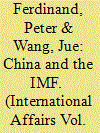

|
|
|
|
|
| Publication |
2013.
|
| Summary/Abstract |
The International Monetary Fund was the international financial institution that was most alien to the Chinese government when it embarked upon its economic reforms at the end of the 1970s, because financial markets were neglected in China's centralized plan. Therefore, China's increasing cooperation with the IMF illuminates the extent to which China has changed through 'socialization' into the norms of global governance more generally.
The article examines the evolution of China's involvement with the IMF and argues that in many respects it has embraced those norms. Even though its political economy still substantially diverges from western prescriptions, many features are compatible with the (original) 'Washington Consensus'.
But China remains wary of becoming too dependent on possible IMF assistance; it tries to preserve its freedom of manoeuvre. Although the IMF has attempted to acknowledge China's growing global importance by increasing its voting rights, this has failed to keep pace with change in the global economy. China is thus attracted by the possibility of additional ways of pragmatically increasing its leverage over global decisions, for instance through regional financial cooperation in Asia.
|
|
|
|
|
|
|
|
|
|
|
|
|
|
|
|
| 2 |
ID:
137501
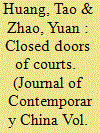

|
|
|
|
|
| Summary/Abstract |
In China, courts may refuse to accept certain legal actions involving financial matters without any solid or explicit legal grounds. An analysis of such a phenomenon should help scholars to understand the functioning logic of China's judicial power. This article suggests that there are a number of reasons behind the filtration system, including a lack of applicable legal rules, a weak ability of the courts to understand complicated financial matters, the background of the economic system transition, the political consideration of ‘maintaining social stability’ and judiciary self-interest. Filtration has inevitably had a negative effect on China's financial markets, and reform is thus necessary.
|
|
|
|
|
|
|
|
|
|
|
|
|
|
|
|
| 3 |
ID:
109238
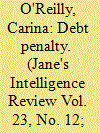

|
|
|
| 4 |
ID:
149520
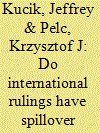

|
|
|
|
|
| Summary/Abstract |
How influential are international courts? Can their rulings reach beyond a given case and affect the behavior of countries not party to the dispute? International law is clear on the matter: rulings have no formal authority beyond the case at hand. This tenet is consistent with the incentives of sovereign states wary of delegating too much authority to courts. By contrast, the authors claim that even in the absence of formal authority, the rulings of international courts can affect behavior by mobilizing pro-compliance groups in countries not party to a dispute. They test these beliefs in the context of the World Trade Organization (WTO) through a novel approach. Because WTO rulings have implications for the fortunes of publicly traded firms, they examine whether financial markets bet on there being spillover effects beyond the case at hand. They rely on two quantitative case studies to test for a cross-border and a cross-industry spillover effect: can rulings have effects in countries and on industries other than those at issue in the initial dispute? The results suggest that the answer is a tentative yes. The spillover effects of international rulings may be a matter of scholarly contention, but their existence is something that financial markets appear willing to bet on.
|
|
|
|
|
|
|
|
|
|
|
|
|
|
|
|
| 5 |
ID:
130721
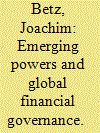

|
|
|
|
|
| Publication |
2014.
|
| Summary/Abstract |
The traditional mode of governance of national and global monetary and financial markets was obviously too weak and piecemeal to hinder the recurrent outbreak of regional and worldwide crises. The latest and gravest in this series triggered a massive institutional and operational overhaul, achieved both by the creation of new institutions and also by old and new ones being made stronger and more inclusive, foremost by introducing major emerging countries into their steering and oversight bodies. During this endeavour, national and institutional self-interests were initially subdued, but would come out forcefully later. As a consequence, the new edifices for multilateral market regulation and surveillance, as well as its financing, went only as far as the difficult compromise of an enlarged body of players would allow. Therefore, regional solutions or cooperation between like-minded countries were often seen as alternatives to a strong multilateral understanding, but are only able to complement the existing international monetary and financial system.
|
|
|
|
|
|
|
|
|
|
|
|
|
|
|
|
| 6 |
ID:
091955
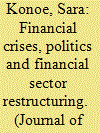

|
|
|
|
|
| Publication |
2009.
|
| Summary/Abstract |
This article analyzes and compares the financial sector restructuring process after the financial crises in Japan and the United States. As these financial crises deepened, countries shifted their policies away from postponing financial sector restructuring toward more thorough reforms. The impacts of different political structures are examined through the Small-N Case Study method. Cases include: the bursting of the financial bubble in the 1990s in Japan and the Savings and Loan crisis in the 1980s in the USA, both of which are analyzed through a review of academic literature, journalistic writings, and statistical data from the World Wide Web.
|
|
|
|
|
|
|
|
|
|
|
|
|
|
|
|
| 7 |
ID:
089399
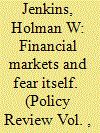

|
|
|
| 8 |
ID:
116882
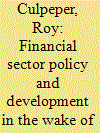

|
|
|
|
|
| Publication |
2012.
|
| Summary/Abstract |
Financial sector liberalisation has led to market failure on a massive scale. In industrial countries market failure led to the Great Financial Crisis that erupted in 2007 and continues into its fifth year. In developing countries liberalised financial markets have failed to provide access to financial services for the vast majority of households and firms. Small and medium-sized enterprises (smes), which are critical for employment, income creation and economic development, are particularly excluded by liberalised private financial markets. Market failure necessitates government intervention. To enhance smes' financial access requires an activist role by governments-not only by ensuring an enabling policy framework and financial infrastructure for smes, but also by supporting direct provision of financial services through national development banks and directed credit programmes. More broadly the crisis also provides an opening for a neo-structuralist development paradigm to replace the failed Washington Consensus. In this context activist financial sector policies should be integrated with industrial sector strategies.
|
|
|
|
|
|
|
|
|
|
|
|
|
|
|
|
| 9 |
ID:
078487


|
|
|
|
|
| Publication |
2007.
|
| Summary/Abstract |
What will be the legacy that President George W. Bush bequeaths to his successor in the fields of global trade and finance? In answering this question, the article will analyse the three most crucial international economic issues that the Bush administration has faced during its two terms in office. First, Bush's policy of trade liberalization will be considered. While the United States has negotiated a significant number of new bilateral and regional trade agreements over the past 7 years, global trade talks remain deadlocked. With increasing protectionist sentiment in evidence in Congress, Bush is unlikely to conclude the Doha Development Round by the time he leaves office in 2009. Second, global trade imbalances partly caused by the US current account deficit threaten the stability of international financial markets and global prosperity. The article concludes that the US has pursued a policy of 'begin neglect' towards the problem and needs to act more proactively to prevent a hard landing for the American and world economies. Finally, the economic relationship between the US and China is examined. The article argues that the United States needs to continue to engage China in the interests of global economic growth and regional stability in Southeast Asia while avoiding a trade conflict
|
|
|
|
|
|
|
|
|
|
|
|
|
|
|
|
| 10 |
ID:
192325
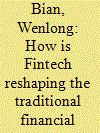

|
|
|
|
|
| Summary/Abstract |
We examine the effect of Fintech on the market structure of traditional financial markets, and focus particularly on InsurTech and the insurance sector. We find that InsurTech has significantly reduced the non-life insurance sector's market concentration but plays a limited role in the life insurance sector's market structure. The results are not driven by potential reverse causality and remain unchanged when we employ an instrumental variables approach and use an alternative supply-side InsurTech index. We further explore the underlying mechanisms and find that, instead of competing directly with insurance companies, Fintech companies provide insurance technologies to traditional insurers and help them lower entry barriers and reduce operating costs. Our paper sheds light on how InsurTech is reshaping traditional insurance sectors, and the results are generalizable to Fintech and financial markets.
|
|
|
|
|
|
|
|
|
|
|
|
|
|
|
|
| 11 |
ID:
152305
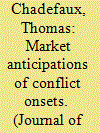

|
|
|
|
|
| Summary/Abstract |
Does the recurrence of wars suggest that we fail to recognize dangerous situations for what they are, and are doomed to repeat the errors of the past? Or rather that policymakers correctly anticipate the consequences of their actions but knowingly choose conflict? Unfortunately, little is known about how well wars are anticipated. Do conflicts tend to come as a surprise? I estimated the risk of war as perceived by contemporaries of all interstate and intrastate conflicts between 1816 and 2007. Using historical financial data of government bond yields, I find that market participants tend to underestimate the risk of war prior to its onset, and to react with surprise immediately thereafter. This result illustrates how conflict forecasts can be self-fulfilling or self-defeating. Present predictions may affect future behavior, such that wars may be less likely to occur when they are predicted, but more likely when they are not. I also show that the forecasting record has not improved over the past 200 years, and that wars involving democracies lead to greater market shocks. These findings also have implications for the way decisionmakers respond to new information, and how audiences perceive the risk of war and hence their leaders’ actions.
|
|
|
|
|
|
|
|
|
|
|
|
|
|
|
|
| 12 |
ID:
152300


|
|
|
|
|
| Summary/Abstract |
The forecasting literature has come to mistrust the predictions made by experts who forecast political events in mass media. Distinguishing between judgements made by one or few individuals (‘oracles’) and assessments made by larger groups (‘crowds’), we contrast journalistic predictions with forecasts stemming from the financial industry. These two competing views were evaluated in a quantitative analysis of the ex ante success of 24 ceasefire agreements in various conflicts which took place in the Levant from 1993 to 2014. Our analysis compares the forecasts appearing in press commentaries (Haaretz, Jerusalem Post and New York Times) with the expectations that the Tel Aviv Stock Exchange had about the stability of these cooperative efforts. To evaluate the predictions of these very dissimilar sources, the effectiveness of the ceasefires was analysed through the number of violent events following the official start of the truce. The analysis shows that the financial industry performs better than the media industry in the comparative evaluation of ceasefire forecasts, but that neither source provides sufficiently accurate predictions. The partial support for the crowd thesis is discussed in light of recent literature that resuscitates the usage of well-trained experts for forecasting purposes, but warns against the dramatizing predictions of media pundits.
|
|
|
|
|
|
|
|
|
|
|
|
|
|
|
|
| 13 |
ID:
153668


|
|
|
|
|
| Summary/Abstract |
This article explores the relationship between race and finance. By looking closer at risk, this article seeks to contribute to the literature in three ways: First, the concepts of risk and uncertainty need to be understood from a post-colonial perspective. Second, through a post-colonial reading of risk, we seek to develop a different concept of risk itself which emphasises its three qualities of de-humanisation, de-socialisation, and de-territorialisation. Last but not least, we propose to understand the post-colonial critique not only as a reconstruction of Europe’s past, as Dipesh Chakrabarty has named it, but locate it at the intersection of the present and the future: The post-colonial critique is enacted as soon as Europe’s future is imagined through risk.
|
|
|
|
|
|
|
|
|
|
|
|
|
|
|
|
| 14 |
ID:
131501
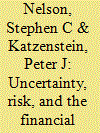

|
|
|
|
|
| Publication |
2014.
|
| Summary/Abstract |
The distinction between uncertainty and risk, originally drawn by Frank Knight and John Maynard Keynes in the 1920s, remains fundamentally important today. In the presence of uncertainty, market actors and economic policy-makers substitute other methods of decision making for rational calculation-specifically, actors' decisions are rooted in social conventions. Drawing from innovations in financial markets and deliberations among top American monetary authorities in the years before the 2008 crisis, we show how economic actors and policy-makers live in worlds of risk and uncertainty. In that world social conventions deserve much greater attention than conventional IPE analyses accords them. Such conventions must be part of our toolkit as we seek to understand the preferences and strategies of economic and political actors.
|
|
|
|
|
|
|
|
|
|
|
|
|
|
|
|
| 15 |
ID:
073759
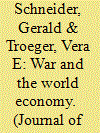

|
|
|
|
|
| Publication |
2006.
|
| Summary/Abstract |
One of the perennial questions in the scientific study of war is how war affects the economy. The authors examine the influence that the political developments within three war regions had on global financial markets (CAC, Dow Jones, FTSE) from 1990 to 2000. They embed a rational expectation framework within commercial liberalism, a theoretical strand that tries to assess the interrelationship between war and economic exchanges. Time-series analyses account for the effects that the conflict between Israel and the Palestinians, the first confrontation of a U.S.-led alliance against Iraq, and the wars fought in Ex-Yugoslavia exerted. Using daily stock market data, the authors show that the conflicts affected the interactions at the core financial markets in the Western world negatively, if they had any systematic influence at all. They argue that these results lend some support to the rational expectations version of commercial liberalism.
|
|
|
|
|
|
|
|
|
|
|
|
|
|
|
|
| 16 |
ID:
101864
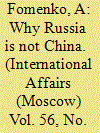

|
|
|
|
|
| Publication |
2010.
|
| Summary/Abstract |
EAST ASIA moved into economic limelight as soon as the Soviet Union left the scene. By 1993, Japanese banks had accumulated half of the assets of the world's 500 largest banks; it even looked, at least to some of the experts, that New York lost its old role of an arbiter and manager of the financial markets.
|
|
|
|
|
|
|
|
|
|
|
|
|
|
|
|
| 17 |
ID:
093743
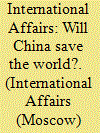

|
|
|
|
|
| Publication |
2009.
|
| Summary/Abstract |
IN THE CONTEXT of the global financial crisis the successful and highly influential Chinese development model looks like a natural subject of discussion all over the world which explains the interest to John Authers' article "China's Health Gives Rise to Fresh Growth Theory" that appeared in the weekend issue (6-7 June 2009) of The Financial Times.
|
|
|
|
|
|
|
|
|
|
|
|
|
|
|
|
|
|
|
|
|